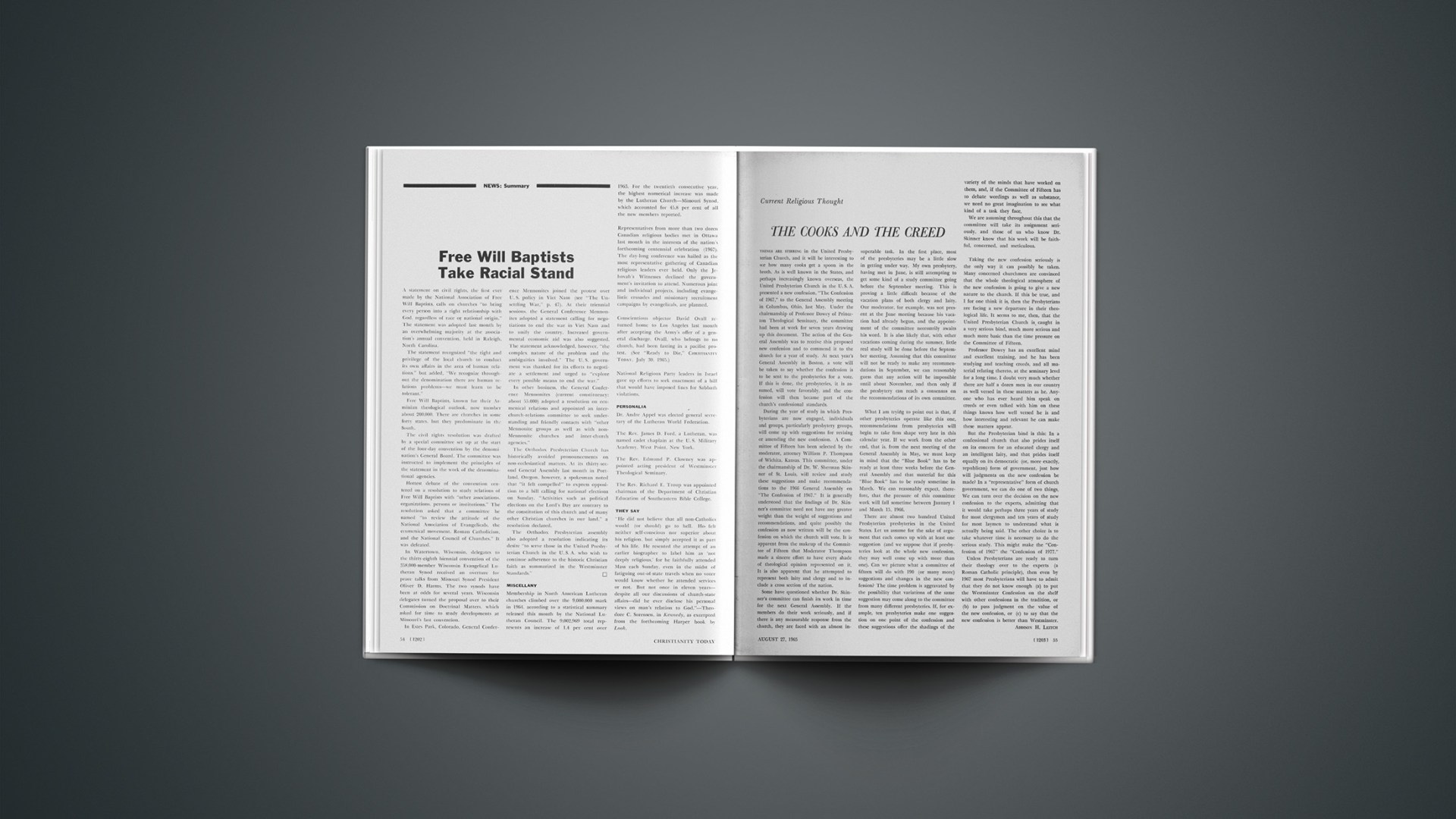A statement on civil rights, the first ever made by the National Association of Free Will Baptists, calls on churches “to bring every person into a right relationship with God, regardless of race or national origin.” The statement was adopted last month by an overwhelming majority at the association’s annual convention, held in Raleigh, North Carolina.
The statement recognized “the right and privilege of the local church to conduct its own affairs in the area of human relations.” but added, “We recognize throughout the denomination there are human relations problems—we must learn to be tolerant.”
Free Will Baptists, known for their Arminian theological outlook, now number about 200,000. There are churches in some forty states, but they predominate in the South.
The civil rights resolution was drafted by a special committee set up at the start of the four-day convention by the denomination’s General Board. The committee was instructed to implement the principles of the statement in the work of the denominational agencies.
Hottest debate of the convention centered on a resolution to study relations of Free Will Baptists with “other associations, organizations, persons or institutions.” The resolution asked that a committee be named “to review the attitude of the National Association of Evangelicals, the ecumenical movement. Roman Catholicism, and the National Council of Churches.” It was defeated.
In Watertown, Wisconsin, delegates to the thirty-eighth biennial convention of the 358,000-member Wisconsin Evangelical Lutheran Synod received an overture for peace talks from Missouri Synod President Oliver D. Harms. The two synods have been at odds for several years. Wisconsin delegates turned the proposal over to their Commission on Doctrinal Matters, which asked for time to study developments at Missouri’s last convention.
In Estes Park, Colorado, General Conference Mennonites joined the protest over U. S. policy in Viet Nam (see “The Unsettling War,” p. 47). At their triennial sessions, the General Conference Mennoniles adopted a statement calling for negotiations to end the war in Viet Nam and to unify the country. Increased governmental economic aid was also suggested. The statement acknowledged, however, “the complex nature of the problem and the ambiguities involved.” The U. S. government was thanked for its efforts to negotiate a settlement and urged to “explore every possible means to end the war.”
In other business, the General Conference Mennonites (current constituency: about 55,000) adopted a resolution on ecumenical relations and appointed an inter-church-relations committee to seek understanding and friendly contacts with “other Mennonite groups as well as with non-Mennonite churches and inter-church agencies.”
The Orthodox Presbyterian Church has historically avoided pronouncements on non-ecclesiastical matters. At its thirty-second General Assembly last month in Portland, Oregon, however, a spokesman noted that “it felt compelled” to express opposition to a bill calling for national elections on Sunday. “Activities such as political elections on the Lord’s Day are contrary to the constitution of this church and of many other Christian churches in our land,” a resolution declared.
The Orthodox Presbyterian assembly also adopted a resolution indicating its desire “to serve those in the United Presbyterian Church in the U. S. A. who wish to continue adherence to the historic Christian faith as summarized in the Westminster Standards.”
Miscellany
Membership in North American Lutheran churches climbed over the 9,000,000 mark in 1964, according to a statistical summary released this month by the National Lutheran Council. The 9,002,969 total represents an increase of 1.4 per cent over 1963. For the twentieth consecutive year, the highest numerical increase was made by the Lutheran Church—Missouri Synod, which accounted for 45.8 per cent of all the new members reported.
Representatives from more than two dozen Canadian religious bodies met in Ottawa last month in the interests of the nation’s forthcoming centennial celebration (1967). The day-long conference was hailed as the most representative gathering of Canadian religious leaders ever held. Only the Jehovah’s Witnesses declined the government’s invitation to attend. Numerous joint and individual projects, including evangelistic crusades and missionary recruitment campaigns by evangelicals, are planned.
Conscientious objector David Ovall returned home to Los Angeles last month after accepting the Army’s offer of a general discharge. Ovall, who belongs to no church, had been fasting in a pacifist protest. (See “Ready to Die,” CHRISTIANITY TODAY. July 30, 1965.)
National Religious Party leaders in Israel gave up efforts to seek enactment of a bill that would have imposed fines for Sabbath violations.
Personalia
Dr. Andre Appel was elected general secretary of the Lutheran World Federation.
The Rev. James D. Ford, a Lutheran, was named cadet chaplain at the U. S. Military Academy, West Point, New York.
The Rev. Edmund P. Clowney was appointed acting president of Westminster Theological Seminary.
The Rev. Richard E. Troup was appointed chairman of the Department of Christian Education of Southeastern Bible College.
They Say
“He did not believe that all non-Catholics would (or should) go to hell. He felt neither self-conscious nor superior about his religion, but simply accepted it as part of his life. He resented the attempt of an earlier biographer to label him as ‘not deeply religious,’ for he faithfully attended Mass each Sunday, even in the midst of fatiguing out-of-state travels when no voter would know whether he attended services or not. But not once in eleven years—despite all our discussions of church-state affairs—did he ever disclose his personal views on man’s relation to God.”—Theodore C. Sorensen, in Kennedy, as excerpted from the forthcoming Harper book by Look.










